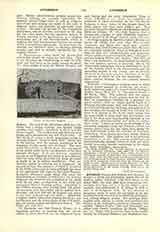

Avicebron, SALOMO BEN JEHUDA BEN GEBIROL (or GABIROI.), whom the Scholastics, taking him for an Arabian, called Avicebrol (this form occurs in the oldest MSS.; the later MSS. have Avencebron, Avicembron, Avicebron, etc.); a Jewish religious poet, moralist, and philosopher, b. at Malaga in 1020 or 1021; d. at Saragossa, 1070. He was educated at Saragossa, where he spent the remainder of his life, devoting himself to moral and intellectual philosophy, and writing religious poetry. His principal philosophical work, written in Arabic, was translated into Hebrew in the thirteenth century by Falaquera, and entitled “Mekor Chaim” [this was discovered and edited with French translation by Munk, “Melanges” etc., (Paris, 1857)], and into Latin in the twelfth century by Johannes Hispanus and Dominicus Gundissalinus (edited by Baumker, Munster, 1895) under the title “Fons Vit”. His poems were published by Munk (“Melanges”, etc., Paris, 1857), and a Hebrew translation of his ethical writings (Riva, 1562, and Luneville, 1840). Avicebron’s philosophy united the traditional neo-Platonic doctrines with the religious teaching of the Old Testament. From the neo-Platonists, whom he knew chiefly through such apocryphal writings as the “Theologia Aristotelis” and the “Liber de Causis” (see Arabian School of Philosophy), he derived the doctrine of emanation, namely: that there emanated from God, in the first place, the Universal Intelligence, that from the Universal Intelligence there emanated the World-Soul, and that from the World-Soul there emanated Nature, which is the immediate principle of productivity of material things. From the same neo-Platonic sources he derived the doctrine that matter is of itself wholly inert and merely the occasion which is made use of by the Infinite Agent to produce natural effects (Occasionalism). On the other hand, he drew from Biblical sources the doctrine that the Supreme Principle in the production of the Universe was not the Thought of God, but the Divine Will, which, in Scriptural phrase, he calls the Word of God. In thus attempting to combine Jewish religious doctrine with neo-Platonism, the doctrine of creation with the notion of emanation, he introduced into his philosophy elements which are logically incompatible.
His most celebrated doctrine, however, the one by which he was best known to the Christian philosophers of the Middle Ages, was that of the universality of matter. All created things, he taught, are composed of matter and form. God alone is pure actuality. Everything else, even the highest among the angels, is made up of matter (not merely potency, but matter like that of terrestrial bodies) and form, just as man is composed of body and soul. The matter, however, of angelic bodies, while it is like terrestrial matter, is of a purer kind and is called spiritual matter. In other words, there are no created “separate substances”, as the Schoolmen called them. Between the pure spirituality of God and the crude materiality of terrestrial bodies there mediate substances composed of matter and form, which range in ascending scale of spiritual-materiality from the soul of man to the highest angelic nature. This doctrine is mentioned by almost all the great scholastics, and referred by them to the “Fons Vitae” for instance, by Albert the Great (Summa Totius Theol., I, q. xlii, art. 22), by St. Thomas (Qust. Disp., De Anima, art. 6; Opusculum De Subst. Separatis, passim), and Duns Scotus (De Her. Princip. VIII, 4). But, while the first two, in common with the other Dominican teachers, refuted the author of “Fons Vit” on this point, the last mentioned, together with Alexander of Hales and others of the Franciscan School, adopted his doctrine as part of their theory of the angelic nature.
WILIAM TURNER

